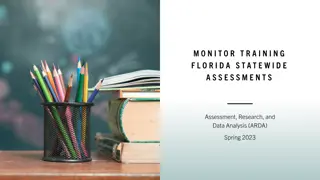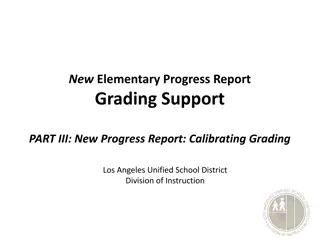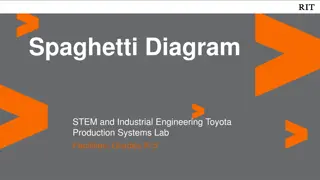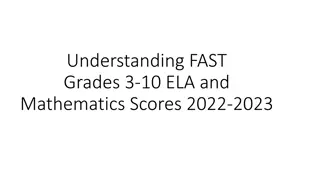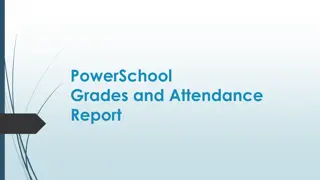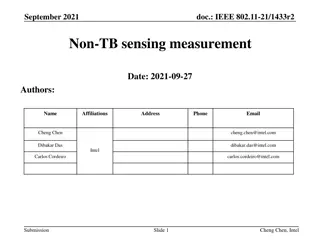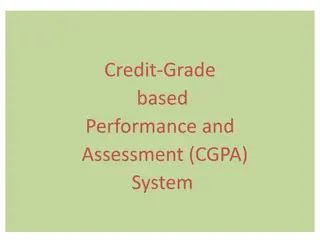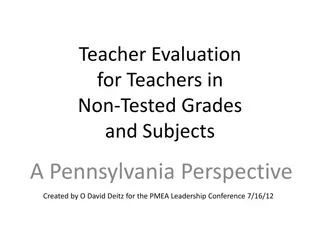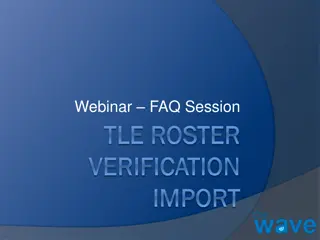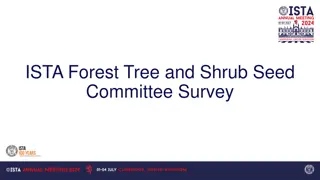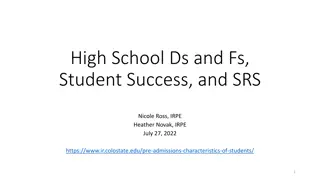How to Effectively Use Study Groups for Better Grades in High School and College
In this article, we\u2019ll unlock the secrets to forming and utilizing study groups effectively, whether you\u2019re looking for a high school study group to ace your next exam or a best college study group to conquer challenging coursework. Read full article https:\/\/explainlearning.com\/blog\/ho
2 views • 3 slides
Understanding Dual Enrollment Program for High School Students
Dual Enrollment is a challenging acceleration program that allows high school students to earn college credits simultaneously. Students can reduce time to complete a college degree, save money, increase chances of graduation, and even pursue industry certifications. Eligibility criteria include enro
1 views • 13 slides
Addressing Learning Losses in Education: Back on Track Initiatives
The COVID-19 pandemic led to significant disruptions in education systems worldwide, causing severe learning losses, especially in the Foundation Phase. The Western Cape Education Department (WCED) implemented the Back on Track intervention in 2022 to address these challenges by increasing time allo
1 views • 14 slides
Understanding Consent and Healthy Relationships in Grades 9-12
Explore the importance of consent, boundaries, and healthy relationships in grades 9-12 through engaging activities and discussions. Concepts like levels of intimacy, setting boundaries, and respecting personal choices are highlighted to promote a culture of mutual respect and understanding.
2 views • 17 slides
Eight Tips for a Successful High School Study Group Boost Your Grades
High school can be a whirlwind of classes, extracurricular activities, and social demands. Juggling it all while maintaining good grades can feel overwhelming. That\u2019s where study groups come in! Joining a dedicated group can be a game-changer, providing a space for focused learning, collaborati
11 views • 4 slides
Abit Sherig - Cloud-Based School Management System by Abit Pvt Limited
Abit Sherig is a cloud-based system designed by Abit Pvt Limited to simplify school management in Bhutan. It helps schools manage student records, curriculum, attendance, grades, discipline, reporting, and more. Teachers can easily post grades, and an online portal provides real-time access for stud
4 views • 19 slides
M O N I T O R T R A I N I N G F L O R I D A S TAT E W I D E A S S E S S M E N T S
Monitoring and Assessment Overview for Florida's Statewide Assessments (ARDA) in Spring 2023 encompass a range of standardized tests administered across districts to ensure test integrity and validity. Tests include FSA, FAST, NGSSS, and B.E.S.T., covering ELA, Math, and Science for various grade le
0 views • 30 slides
Rethinking Assessment in Education: Moving Beyond Grades and High-Stakes Testing
Embracing a gradeless approach and critiquing high-stakes testing, the education system shifts focus to learning and growth, promoting detailed feedback, open revisions, and prioritizing student well-being over constant assessment pressure and anxiety-inducing traditional tests. Potential issues wit
0 views • 20 slides
Progress Report Grading Support: Calibrating Grades in LA Unified School District
Explore the process of calibrating grades in Los Angeles Unified School District to ensure accuracy and consistency. This involves identifying focus standards, collecting evidence of student progress, and practicing grading based on specific CCS strands. Participants develop grade-level agreements f
0 views • 4 slides
Navigating Academic Resources at TWU
Discover the essential resources available at Texas Woman's University's Office of the Registrar, including academic records, online services, grades access, FERPA guidelines, and success tips for students. Learn how to request transcripts, manage schedules, check grades, and ensure academic success
0 views • 19 slides
FIU College of Law Spring 2020 Grade Conversion FAQs
FAQs regarding grade conversion for FIU College of Law students in Spring 2020. Topics include reasons for academic advising session attendance, grade release timing, changing letter grades to Pass, handling A and F grades, and Professional Responsibility requirements.
1 views • 22 slides
Understanding Butter: Grades, Standards, and Usage in Baking
Uncover the nuances of butter in baking, from its definitions to grading standards and optimal usage temperatures. Learn about the different grades of butter, varying fat contents, and key characteristics that affect its quality. Discover the importance of butter's composition in creating baked good
0 views • 13 slides
Exploring Spaghetti Diagrams in STEM Education for Grades K-5
Dive into the world of Spaghetti Diagrams through industrial engineering concepts taught in a Toyota Production Systems Lab for students in Grades K-5. Understand the flow of movement in spaces like houses, learn to create spaghetti diagrams, and discover how they can be applied to rearrange rooms a
0 views • 20 slides
Understanding Non-Aqueous Solvents: Types and Classification
Inorganic non-aqueous solvents play a crucial role in chemical research and industry. This article by Dr. Princy K.G. delves into the classification of solvents based on protonicity, polarity, and aqueous vs. non-aqueous nature. It explores the types of non-aqueous solvents, such as protonic and non
1 views • 29 slides
Science Catch-Up Plan for Grades 7-9: April 2020
Explore a comprehensive catch-up plan for grades 7-9 in natural sciences compiled by Mr. Motsuenyane. The plan covers topics such as physical properties of materials, conducting experiments on strength, flexibility, boiling and melting points, conductivity, and environmental impacts. Grade 8 focuses
0 views • 9 slides
Understanding FAST Grades 2022-2023: ELA and Mathematics Scores Overview
The Understanding FAST Grades 2022-2023 provides detailed insights into the scoring system for ELA and Mathematics assessments from grades 3 to 10. It outlines the three progress monitoring windows (PMs) - PM1, PM2, and PM3 - and explains how the scores are reported at various levels. The provisiona
0 views • 9 slides
Algonquin Middle School Overview
Algonquin Middle School, led by Principal Andrew Reinke and Assistant Principal David Rumoro, provides a comprehensive education for grades 6-8. The school's curriculum covers core subjects like Math, ELA, Social Studies, and Science, with an accelerated course option available. Students follow a st
7 views • 20 slides
International Baccalaureate (IB) Assessment and Examination Overview
International Baccalaureate (IB) assessments and exams process for grades 9 to 12 outlined in detail. It covers exam schedules, assessments, grade predictions, and final result procedures. Grade 9 and 10 students take Ontario exams, while Grade 11 and 12 IB students write IB exams and submit interna
0 views • 21 slides
Overview of Non-Ferrous Alloys in Engineering Metallurgy
Non-ferrous alloys play a crucial role in engineering metallurgy due to their unique properties and advantages over ferrous alloys. This article explores the classification of materials, the limitations of ferrous alloys, and the properties and applications of non-ferrous metals like copper. Copper,
0 views • 25 slides
Furman University Compensation Study: Structure and Market Assessment
Furman University partnered with Towers Watson in 2015 to assess the competitiveness of its compensation levels and establish market-based salary ranges. The study involved determining appropriate job matches, developing salary grades, and analyzing market data for benchmark positions. Internal sala
0 views • 22 slides
Understanding Non-Firm Quantities in Electricity Markets
Non-Firm Quantities in electricity markets involve units with non-firm access not being compensated for their non-firm capacity not getting accommodated on the system. The concept of Firm Access Quantity plays a key role in determining compensation levels for units, with differences in implementatio
0 views • 6 slides
Curriculum Development Process in Pakistan's Education System
The curriculum development process in Pakistan's education system is governed by the Federal Ministry of Education and implemented at the provincial level. The education system consists of three tiers: Elementary (grades 1-8), Secondary (grades 9-12), and University programs. The curriculum focuses
0 views • 36 slides
Understanding Non-Compete Agreements: Enforceability and Requirements
Non-compete agreements are commonly used in the United States to protect businesses from competition by former employees. To be enforceable, these agreements must meet certain requirements, including independent consideration, protection of legitimate business interests, and reasonableness in scope,
0 views • 26 slides
Efficient Guide for Extracting and Managing PowerSchool Grades and Attendance Reports
Comprehensive step-by-step instructions on how to generate, manipulate, and analyze student grades and attendance data using PowerSchool. Learn to select student groups, run reports, copy data to Excel, extract absences, print demographic information, and efficiently manage all gathered data.
0 views • 12 slides
Detection of Low-Grade Hemorrhages in Preterm Infants: Ultrasounds vs. MRIs
This study compares the effectiveness of head ultrasounds and brain MRIs in detecting low-grade hemorrhages in preterm infants. It discusses the incidence of intraventricular hemorrhage (IVH) in very low birth weight infants, classification of IVH, risk factors for IVH, outcomes related to IVH grade
9 views • 33 slides
Comparison of Trigger-based vs. Non-Trigger-based Sensing Measurement in IEEE 802.11
The document discusses the differences between Trigger-based (TB) and Non-Trigger-based (Non-TB) sensing measurement instances in IEEE 802.11 standards, focusing on who initiates the sensing measurement. TB sensing is initiated by the AP, while Non-TB sensing is initiated by a non-AP STA, enabling o
6 views • 13 slides
South Carolina State Assessments Overview
South Carolina conducts statewide assessments known as SC READY and SC PASS to measure student proficiency in ELA, Math, and Science. All students in grades 3-8 are required to take SC READY, except those with significant cognitive disabilities. SC PASS assesses Science for grades 4, 6, and 8. The a
0 views • 9 slides
Comprehensive Overview of HUBS Graduation Program for Grades 9-12
Explore the HUBS Graduation Program for Grades 9-12 including course offerings, required credits, transition planning, and British Columbia Graduation Program requirements. Learn about essential courses, volunteer experience, and graduation transitions. Get insights on personal health, community con
0 views • 9 slides
Official Release of 2020 Grade 6 National Assessment Results
Ministry of Education's Human Resource Planning, Vocational Training & National Excellence has officially released the results of the 2020 Grade 6 National Assessments. The results summary includes data on entry statistics, mean raw scores by gender, distribution of grades in Maths and Language Arts
5 views • 13 slides
Comprehensive Guide to Credit-Grade Performance Assessment (CGPA) System
Explore the Credit-Grade based Performance and Assessment (CGPA) system including the conversion of marks to grades, calculations of Semester Grade Point Average (SGPA) and Cumulative Grade Point Average (CGPA), and the conversion of CGPA into grades. Understand how grades, grade points, and percent
0 views • 6 slides
Marshmallow Slime Experiment: Microwave Time Impact
Exploring the impact of microwave duration on marshmallows for making slime, this experiment tested different times to observe how it affects marshmallow consistency and slime stretchiness. By varying microwave times, from 25 to 35 seconds, the researcher recorded changes in marshmallows and slime a
0 views • 13 slides
Teacher Evaluation in Non-Tested Grades: A Pennsylvania Perspective
This document discusses the teacher evaluation system for educators in non-tested grades and subjects in Pennsylvania, emphasizing factors like classroom observation, student performance, and professional responsibilities. It covers the assessment criteria and frameworks used to evaluate teacher eff
2 views • 58 slides
Participation Steps for Success: TLE Roster Verification & Import Guide
In this comprehensive guide, discover the essential steps for successful participation, TLE roster verification, and import processes. From tested grades and subjects to English as a Second Language programs, this guide covers a wide array of topics to ensure a smooth and efficient workflow for educ
0 views • 28 slides
Access to Disability Benefits and Housing for Adults
Learn about Disability Rights UK and their efforts in promoting independent living, career opportunities, and influencing public attitudes towards disabilities. Explore means-tested vs. non-means-tested benefits, including Employment and Support Allowance and Universal Credit. Get insights into the
0 views • 22 slides
Implementation of Cell Phone Policy to Improve English Grades at Richwoods High School
Implementation of a cell phone policy at Richwoods High School was driven by the need to enhance English grades and academic performance. The policy aims to reduce distractions and disruptions caused by non-academic cell phone use in classrooms. Results from previous semesters showed significant imp
0 views • 9 slides
Guide to Entering Grades in Banner System
This guide provides step-by-step instructions on entering grades in the Banner system, including using Internet Explorer, logging in, navigating to the Faculty page, selecting courses, and ensuring grades are successfully saved. Tips for checking grade submission are also included. Follow the outlin
0 views • 21 slides
Understanding Quality Grades of Meat
Quality grades of beef are based on factors like marbling, tenderness, and age of the animal. Grades range from Prime to Cutter, influencing the meat's flavor and juiciness. Lamb and poultry also have quality grades, while pork is not graded by the USDA due to its consistent tenderness. Assessing ma
0 views • 33 slides
Traits of a Genuine Christian: Lessons from Psalm 26
Explore practical lessons from Psalm 26 that highlight the characteristics of a genuine Christian. Delve into topics such as faith in God, desiring to be tested by Him, walking in truth, and sharing God with others. Understand the importance of trusting God, being tested for faithfulness, separating
0 views • 10 slides
Overview of Forest and Shrub Seed Testing Committee Activities
This document provides valuable insights into the activities of the ISTA Forest Tree and Shrub Seed Committee, including information on tested species, laboratory processes, and contributions to the seed trade. It outlines key questions posed to laboratories, details the most tested species, and hig
0 views • 17 slides
High School Ds and Fs Analysis for Student Success at CSU
Analyzing the association between high school D or F grades and first-year success at Colorado State University (CSU). The study explores the usefulness of D or F grades as a metric for classifying students as Student Retention Students (SRS). Various methodological approaches like CART Analysis, De
0 views • 15 slides






